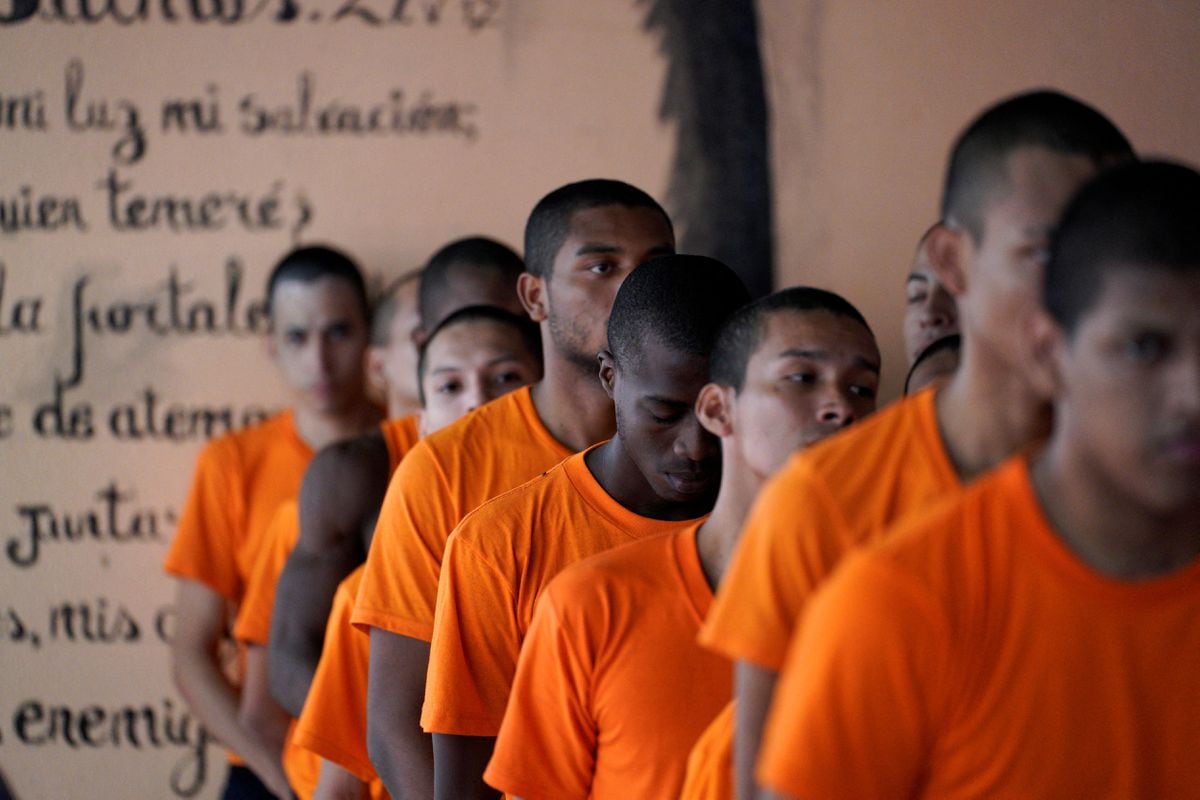Samir has spent the last seven years of his 27 in prison.
When he was free he hardly read.
“I preferred going out to party than sitting down with a book,” he admits from the Albocàsser prison in Castellón, where he is serving his sentence.
Now, however, he is not only an avid reader - "between 25 and 30 books a year, although now they are less because I spend part of the time studying to graduate in psychology" - but he is also in charge of the library of this prison .
He classifies the 9,476 copies he has and, once a month, submits a list of possible acquisitions to the prison management.
"I make it by reading
Babelia
[EL PAÍS's weekly Culture supplement], or what I hear on television and radio," he adds.
The two novels by Manuel Jabois have just arrived and he has asked
La Bestia
, the book by Carmen Mola that won the Planeta Prize.
For Samir, reading books has become "an escape" that allows him to forget about the more than twenty years of his remaining sentence for a "very serious" crime.
Currently, that literary escape route is
Lluvia fina
, by Luis Landero.
The 46,400 inmates that are currently in the 68 prisons dependent on Penitentiary Institutions (all except those of Catalonia and the Basque Country, which are managed by their autonomous governments) have a central library in each one, in addition to a small space with books in each modules where the cells are.
In total, they hoard 871,202 copies, according to the count made on December 31 of last year.
A number that is distributed unevenly depending on the inmate population of each center.
The Picassent prison in Valencia, the largest in Spain with just over 2,000 inmates, holds 36,000 copies.
The one in Albacete, one of the smallest with about 250 prisoners, has 4,700 volumes.
60% of the titles correspond to narrative and poetry.
The rest is divided between comics, popular volumes,
university study manuals and law books.
“The Penitentiary Legislation Manual is the most widely read.
All prisoners want to know how to apply for a permit”, says José Antonio Pérez Yuste, head of the Penitentiary Institutions Training Area, and ultimately responsible for prison libraries, to explain the preference for the latter.
Legal books aside, Pérez Yuste assures that the list of the most read authors in prisons does not differ much from the one that could be drawn up with loans from any library in Spain.
Ken Follet, Alberto Vázquez Figueroa, Arturo Pérez-Reverte, Stephen King and Dan Brown topped the 2021 list, in that order. They were followed by Paulo Coelho, Javier Castillo, Santiago Posteguillo, Juan Gómez Jurado, Carlos Ruiz Zafón, Elisabet Benavent and Xavier Fences.
“Narrative rules, although a lot of poetry and comics are also read.
Those of Asterix, for example, are highly demanded, even more than those of Mortadelo”, details the high charge of Penitentiary Institutions.
However, the statistics reveal a disparity of tastes from one prison to another.
The work of Antonio Machado appears among the most widely read in that of Fontcalent (Alicante).
Nothing
, by Carmen Laforet.
And in Albolote (Granada), Pablo Neruda's books.
A survey of Penitentiary Institutions carried out in 2014, the only one that has been done on this issue, revealed that more than half of the prisoners read more inside the prison than when they were outside.
49% of them did it for entertainment and 22%, to improve their cultural level.
"Reading allows them to be more tolerant, more open to the world," says Pérez Yuste to emphasize the important role that books play in the reintegration of inmates.
Mario consults a book in the Estremera prison library (Madrid)Claudio Alvarez
The operation of a prison library is identical to that of any other.
Prisoners must register to be able to order copies and meet return deadlines.
If they do it late or deliver the book in poor condition, they are sanctioned without being able to check out books for a while.
Last year, a monthly average of 6,931 prisoners followed this protocol.
David, 38, is one of the three prisoners in charge of the Estremera prison library in Madrid.
On the table where he has the computer in which he is updating the list of books rest several that have just arrived from the donation of an individual.
There are several of Jules Verne and a copy of
Altered Truths
, by Boris Izaguirre.
When they are classified and labeled, they will be incorporated into the more than 15,000 copies (there are also video films and music discs) arranged by theme on simple metal and wooden shelves.
There are quite a few in other languages -Chinese, English, French, Romanian, Danish, Georgian...-, sent mostly by the embassies in Spain of the foreign prisoners' countries of origin.
The motivation that leads inmates to ask for books in this prison is varied.
“There are those who take children's stories with them when they go to have visits from their young children to read them to them.
Others choose illustrated to use their photographs as a model for their drawings.
But the majority opts for novels, especially crime novels, although when Valentine's Day approaches, those who ask for poetry increase," adds David, who received five requests that day, April 29 ―" the usual thing is about 20 or 30″―.
Two of them come from the isolation module, where the prisoners are classified in the first degree, the hardest, due to their maladjustment to the prison system.
Both have ordered manga books, the Japanese comic.
Vanessa Caamaño is an English language philologist and prison officer.
In the Estremera prison, she is in charge of a reading initiation program in which 26 men and six women participate who are trying to leave their drug addiction problems behind.
"Most come from social backgrounds with no interest in reading or education, who have dropped out of school very early," says this prison worker.
To encourage them, Vanessa reads them fragments of works such as
The Count of Monte Cristo
, by Alejandro Dumas, or
El Camino
, by Miguel Delibes, and asks them questions about what they have heard to later open a debate with them.
So far only three of them have become regular readers.
One is a woman in her 50s who learned to read only five years ago.
“These cases are very rewarding,” she admits.
During the past year, Penitentiary Institutions held 441 reading promotion activities in which an average of 1,183 prisoners participated per month, and 110 conferences were given by writers inside the prisons.
Mario is of Cuban origin, he is 49 years old and he still has almost six years left to serve of the 10-year sentence imposed on him by a court.
A musician by profession, he assures that he is "new" to reading.
“I have only been reading assiduously for four months.
I started because other colleagues encouraged me to do so, ”he says.
He opts for self-help books, historical ones or fantastic literature.
"They help me stop thinking that I'm in jail," he adds and remembers that the first time he picked up a book in prison he was surprised to see how several hours passed almost without realizing it.
Now he encourages other classmates to follow his example.
The last thing he read was
The Instant Millionaire
by Mark Fisher.
He is going to start
the pillars of the earth
, from Follett.
“It has been recommended to me.
In prison, word of mouth works the most,” he adds.
From 'Cienfuegos' to 'The Cathedral of the Sea'
These are the 10 most read titles in Spanish prisons last year, according to statistics from Penitentiary Institutions.
-
Cienfuegos
, by Alberto Vazquez Figueroa
-
The Pillars of the Earth
, by Ken Follett
-
A Pillar of Fire
, by Ken Follett
-
Red Queen
, by Juan Gómez Jurado
-
The day madness was lost
, by Javier Castillo
-
The Queen of the South
, by Arturo Pérez-Reverte
-
Soldiers of Salamina
, by Javier Cercas
-
The day love was lost
, by Javier Caztillo
-
The Physician
, by Noah Gordon
-
The Cathedral of Evil
, by Ildefonso Falcones
Exclusive content for subscribers
read without limits
subscribe
I'm already a subscriber









